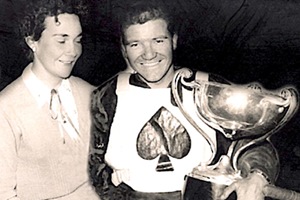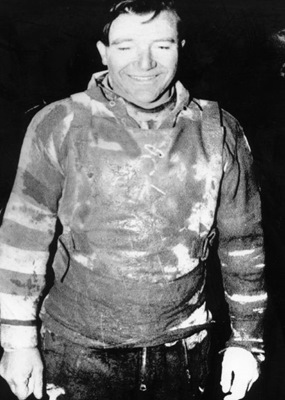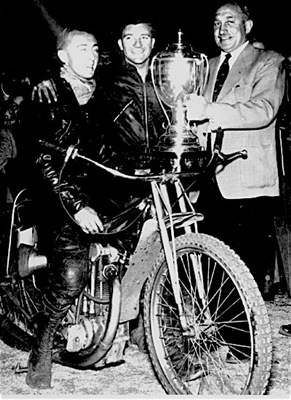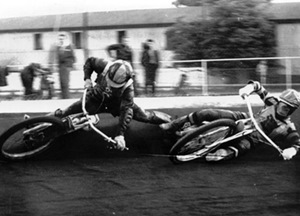
| Home | Contact Us | Articles |
| Books - DVDs | Stadia Pix | Programme Generator |
Dave Collins
By John Hyam
 |
| Dave Collins receives a trophy from a young admirer in the 1960s. |
As a schoolboy, Dave Collins used to sneak in at pre-war West Ham meetings. After WorldWar Two service in the Royal Navy, he emigrated to South Africa to work as a gold-miner and earned enough money to buy a speedway bike. When he left his London home in late 1947 for South Africa it was to find fame and fortune as a gold miner. He never found that elusive pot of gold, but he did find fame as a speedway rider and for some 20 years was a well-known figure in the sport in the Republic.
Collins, now living in Munster, South Africa, recalls: "Before the war, I was a keen West Ham supporter and from around 1937 used to sneak myself into the Custom House Stadium without paying. That was naughty of me, but that sort of thing was a way of life then for East End kids." The 1938 world champion 'Bluey' Wilkinson was Dave's big hero, although there were other pre-war West Ham stars he admired including the Canadians Eric Chitty and Jimmy Gibb, and the England ace Arthur Atkinson.
Dave Collins was born in Plaistow in London's East End, and in the closing years of World War Two saw service in the Royal Navy. "When I came out of the forces in 1947, I tried to get into speedway racing but just could not afford it. I was wondering what to do with my life when I saw an advert in an evening newspaper for gold miners to work in South Africa. In March 1948, I started an eight-month stint working underground at 10,000 feet - that's nearly two-miles. It was dreadful - no place for human beings really, but I needed the money. When I left the mines, it was just as a boom for speedway was starting and I bought a bike on hire-purchase terms from Buddy Fuller, who was promoting and riding in South African meetings.
"My first competitive meeting at Dunswart in 1949 proved a disaster. In my first ride I hit the safety fence and broke my collar-bone. But I persevered and established myself in South African speedway. Before leaving for England at the start of the 1951 British season, I sold my bike to another rider who promised to forward the money to me in England. I spent most of the summer waiting for the cash to arrive, and just as I was doubting if it would ever come, it was deposited in my bank account just as the British season was coming to an end. By then I was the owner of a bike reputed to be a Vic Duggan 'Black Duck." I always doubted the authenticity of this, but it was a very fast bike and served me well when I returned to South Africa."
 |
| Dave Collins after a rare wet night at Durban. |
As a rider in the South African League, Collins rode for the Johannesburg-based Wembley Lions, Randfontein Aces, Boksburg Bees and Springs Stars. "There was also a very fluid guest rider system operated by Fuller, You could be a regular for example with Springs, but also be called into action for any of the other teams if a need arose. Over the years, the South African League was very competitive. Riders like Ronnie Moore, Barry Briggs, Trevor Redmond, Freddie and Ian Williams, Alan Hunt, Ron Mountford and Basse Hveem were just a few of the European stars who rode in it. And of course South Africa had its own big stars like Henry Long, Doug Davies, Buddy Fuller, Doug Serrurier and Trevor Blokdyk proving their worth over the years. At its peak, the sport probably equalled what was being seen in Britain."
Collins added: "For most of 1951, I did second-half rides at various British tracks. The sport was very competitive and it was hard to get chances. But when they came along, you never turned them down. I remember taking my bike and gear on the tube from Plaistow to Liverpool Street, then pushing the lot across London to Paddington just to have a second-half ride at Cardiff." The end of the British season saw Collins return to South Africa. "There the 'Black Duck' lived up to its Vic Duggan-legend and I did very well with it," he commented.
Collins was back in England for the 1953 season. "At the start of the season I was given second-half rides at two London tracks that could not be more different, the 262-yard New Cross and the 440-yard West Ham track. From these tracks I signed for Swindon and again was confined to the second-half. Desperate to get more experience, when the offer of 10 meetings in Spain came along I jumped at the chance. I later heard that had I stayed in England, I would have been given a team chance with Swindon. It's academic now and the only person who might have confirmed it was Norman Parker's wife Jean who ran the track office."
Before going to race in Spain, Collins was involved in a Phil Bishop-managed tour of Holland. He said, "I really enjoyed that venture. Besides Bishop, others who raced in the Dutch meetings included Howdy Byford, Pete Lansdale and Roy Craighead - all of whom had won big reputations over the years with various British teams. "We appeared in three wonderful stadiums - the Olympic Stadium in Amsterdam, at the Feynoord Stadium in Rotterdam, and at Hengelo, which is up on the Dutch-German border."
He recalls of the period spent in Spain. "The British organiser was Ted Gibson who rode for several British tracks during the late 1940s. Even now, the mention of his name and how he handled the tour sends my blood pressure up a couple of notches. Gibson's role was to organise things like getting us accommodation and to the meetings. The promoter was a former German Luftwaffe pilot Hans Fabry. He owned a Piper Tripacer aircraft and used to fly from Barcelona to meetings in Majorca while the riders froze on the deck of a rust- bucket ferry ship."
In late 1953, South African-based English rider Dave Collins was part of a British team that went to pioneer the sport in Spain. He has an amusing recollection of the racing-manager Ted Gibson who fell out with the riders over delays in paying their wages and hotel expenses. Collins said of Gibson: "He could not see anything without his spectacles. When we were in Tarragona one rider - I think it was Jimmy Wright - hid his glasses. It left Gibson forced to wear his special racing goggles - these also had lenses like 'the bottom of a Coca-Cola bottle.' Passers-by used to stop and point at him."
Collins vividly recalls trying to race speedway on the bull rings in Barcelona, Tarragona and Majorca. "The racing was exciting and, with no straights, falls were frequent - usually after the race! Initially, the Spanish people were disinterested but they soon became very excited by the racing from us who they dubbed 'El Suicidos' - it was magic."
When the tour ended, most of the British riders needed financial help from the British Consul to get home. Collins said: "I was not involved as I managed to get a lift back to England with the New Zealand road racing star Ken Mudford and he took me to Plumstead where he left his bikes for tuning at the AJS motorcycle factory. I then made my way onto Romford. "There is no doubt, this Spanish speedway tour was a disaster financially, but did provide some interesting insight into the Spanish way of life which, even being then under the government of General Franco, was a virtual paradise and from that aspect I really enjoyed myself."
 |
| Henry Long on bike and Dave Collins after winning a best pairs trophy in the 1960s. |
It was not until 1962 that Collins again tried his luck in England. He explained: "My mother was seriously ill and I stayed in Romford for 10 weeks. In that time, I was given the use of a bike owned by the former Birmingham rider Doug Davies, who had left it with the engine-tuner Victor Martin. Davies gave me permission to use it while I was in England. "I was signed to ride for Plymouth in the Provincial League, but they closed after I spent two weeks with them. Then I signed for Leicester but before I really got started I had to return urgently to South Africa."
Leading promoter Mike Parker was the next person to entice Dave Collins back for another try in British speedway. Collins recalled: "Parker wrote offering me a team place at Sunderland. As my pal Vic Ridgeon was also racing there, I jumped at the opportunity and travelled over with my wife Val. "It was not a happy experience. I never really got on with either Parker or his co- promoter Bill Bridgett. Out of the blue, they just closed down Sunderland and Val and I were stranded. "We decided to ship our Commer Caravan to the continent and travel around, eventually reaching Gothenburg in Sweden on the night of the world championship final. That was a highlight of speedway spectating for me."
 |
| 1964 - probably at Sunderland Dave Collins, left, and James Bond have a problem! |
Just before setting out for Europe, Collins raced in a meeting at Rayleigh who were then in dispute with the Control Board. As a result, Collins and the other starters at the meeting were branded as rebels. This verdict soured him permanently against continuing in British speedway. He said: "After 1964, I soldiered on in South African speedway. The most memorable part of that period was in 1967 when I was invited to captain the British team in a test match in Cape Town. "Cape Town is 900 miles from where I was living in Johannesburg. I finished work at 5pm, rushed to the airport on my Laverda motorcycle to catch the 6pm flight. When I arrived in Cape Town, I was met by car and rushed to the outside of the stadium, then flown into the arena by helicopter. It was a great experience."
Racing in South African, Collins rode three times for England in the 1949-50 test series and again for England in 1967. He also rode in three tests for Overseas against England in 1953-54 and for the British team against South Africa in 1971. Besides racing for a variety of South African league teams, Collins also partnered Australian star Junior Bainbridge when they won an International Pairs tournament at Randfontein in the 1954-55 season.
After retiring from speedway, Collins was keen to get involved with a training school being run by former Wimbledon rider Peter Murray. "That was soured for me when I heard somebody mutter something about 'old riders who will do anything to get into a meeting for nothing and are out to get themselves noticed.' At first, I thought it was a joke but the guy concerned turned out to be serious. I never went to another practice session."
Even away from speedway, Dave Collins still sought adventure and excitement. "In 1972, I joined the South African Volunteer Reserve Squadron and flew as a pilot with them. When I left in 1984 it was with the rank of captain, so I feel that was also something of an achievement. "But nothing can ever recapture the magic of the years in speedway. Despite quite a lot of injuries, I would race all over again."
This article was first published on 1st May 2017

"I think the photo was taken at Wolverhampton and not Sunderland. Dave is in Y/B which suggests he was a visitor."